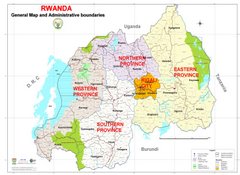
One of the most-wanted suspects in the 1994 Rwandan genocide has been arrested in Uganda, police say.
Former intelligence chief Idelphonse Nizeyimana is accused of organising the killing of thousands of ethnic Tutsis - including the revered former queen.
Correspondents say he was travelling to Kenya from the Democratic Republic of Congo when he was detained.
Some 800,000 Tutsis and moderate Hutus were killed by Hutu militias during 100 days of slaughter.
The BBC's Will Ross, in the Kenyan capital Nairobi, says Mr Nizeyimana was detained in Kampala carrying false identity documents.
Murder and pillage
Mr Nizeyimana, a captain in the army, was head of intelligence and military operations during the genocide and is accused of setting up special military units to help carry out the slaughter.
RWANDA GENOCIDE
6 April 1994 Hutu President Juvenal Habyarimana killed when plane shot down
April - July Estimated 800,000 Tutsis and moderate Hutus killed
July Tutsi-led rebels capture capital city, Kigali
July Two million Hutus flee, sparking 15 years of unrest in the region
One of these units is believed to have killed Queen Rosalie Gicanda, widow of King Mutara III who died in 1959 shortly before the country became a republic.
According to a 1999 report by US-based Human Rights Watch, Hutu soldiers took the queen from her home in the south-eastern town of Butare and shot her behind the national museum.
They also murdered several women who looked after the queen, who was about 80 years old when she died.
They returned the next day and shot her mother and pillaged her house.
The rights group said the murder of the queen, who had kept out of politics since her husband's death, alerted many Tutsis to the danger they faced.
Intelligentsia attacked
A Ugandan police spokeswoman confirmed Mr Nizeyimana had been arrested on Monday and flown to the International Criminal Tribunal for Rwanda, based in Arusha, Tanzania.
Idelphonse Nizeyimana
Idelphonse Nizeyimana allegedly helped draw up death lists
ICTR officials said they could not confirm the arrest, but described Mr Nizeyimana as one of their highest targets.
He faces charges of genocide and crimes against humanity.
The indictment against him includes allegations that he ordered soldiers to kidnap a group of refugees, including 25 children, from a convent, and they were never seen again.
He also allegedly ordered the kidnap of two priests who were later killed.
He ordered roadblocks to be set up where people carrying ID cards identifying them as Tutsis were hacked to death with machetes, and he helped draw up lists of Tutsis to kill, the tribunal says.
Troops under his command also rampaged through the University of Butare, killing lecturers and students.
BBC Africa analyst Martin Plaut says this was part of an attempt to wipe out the Tutsi intelligentsia.

